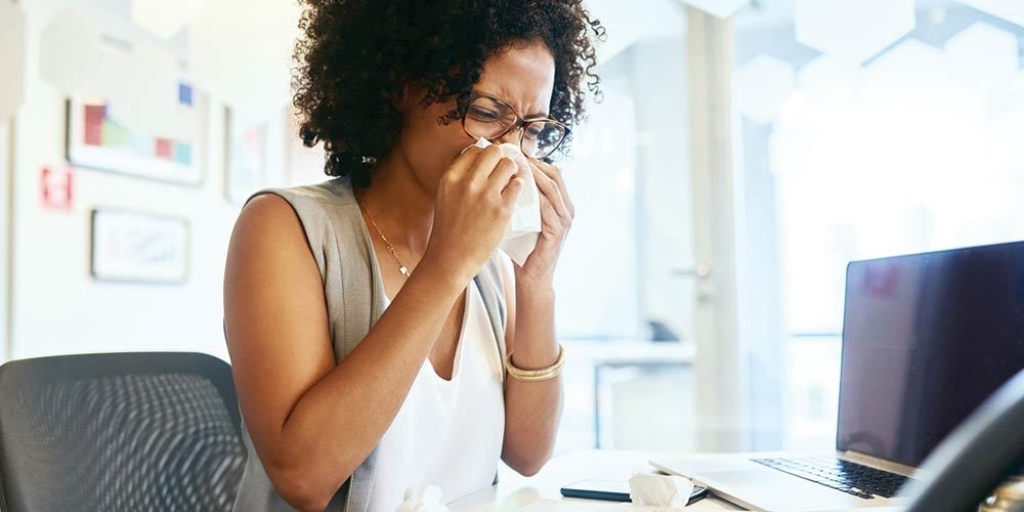Do I Have a Cold, or Do I Have Allergies?

It’s that time of the year again where the pollen and other allergens are flying around in the air, causing sneezing and watery eyes everywhere. Not only are there allergens out, but many people also experience a summer cold around this time of the year. When you suddenly start sneezing and feel a scratchy throat come on, is it allergies or a common cold?
What are the Symptoms of a Summer Cold?
Symptoms of a summer cold vary from person to person. However, the onset of symptoms typically appears around one to three days following the exposure. For example, if you were around a relative who was sick during a weekend, chances are you will notice the symptoms of the cold-causing virus by mid-week.
Symptoms may include all or some of the following:
- Sore throat
- Sneezing
- Congestion
- Cough
- Low-grade fever
- Mild headaches
- Minor body aches
- Malaise (general unwell feeling)
What is the Diagnosis and Treatment of a Summer Cold?
Usually people can be diagnosed just by the signs and symptoms. However, if your doctor feels you may have a bacterial infection, you may need an X-ray or other testing.
There’s not a cure for a cold. Antibiotics won’t work since they only fight bacterial infections. A cold is a viral infection. Treatment consists of decreasing the discomfort of symptoms until the cold gradually goes away.
Decongestant nasal spray - Adults can use a nasal spray or saline to breathe a bit easier when a stuffy nose occurs.
Pain relievers - When a headache, sore throat, or fever is present, Tylenol can help but should only be used short term.
Cough syrups or tablets - Some cough syrups or other cough medicine (tablets) can help soothe the throat. Note: watch the ingredients if you combine a cold medicine and pain reliever. Too much of the same ingredient could lead to an accidental overdose. The best thing to do is to check with a physician first.
Other things you can do to speed up your recovery process is to rest as much as possible, drink plenty of fluids to avoid dehydration, and use a humidifier.
What are the Symptoms of Allergies?
People are usually ready for the frigid winter months to end and are impatiently waiting for the warm sunshine. While the warm temperature is nice, the allergies are far from it. According to the American Academy of Allergy, Asthma & Immunology, eight percent of Americans experience allergies. Allergies occur because your immune system overreacts to outdoor allergens. Pollen is usually the most common and causes an allergic response, leading to pesky symptoms.
- Stuffy or runny nose
- Sneezing
- Itchy sinuses, ear canals, or throat
- Postnasal drainage
- Ear congestion
- Itchy and watery eyes
How to Prevent Summer Colds
Like most viruses, there is no way to completely prevent a summer cold. However, there are some ways you can reduce your chances.
Get plenty of rest - Sleep is vital as it not only rejuvenates the body, but it also resets the immune system every day so it can properly function.
Avoid people who have a cold - When someone has a cold, keep your distance. If you happen to touch something they did, wash your hands.
Take care of yourself - Eat healthy meals, take your supplements, and avoid excess stress.
Wash hands - Be sure to wash your hands when you’re out in public spaces, especially in public restrooms.
How to Tell if It’s Allergies or a Summer Cold?
Now that the warm weather is here, it can be hard to determine if you have a cold or seasonal allergies. You can differentiate a cold from allergies by how long it lasts, when it happens, when it starts, the color of nasal discharge, and muscle aches or temperature.
How long it lasts - If it’s a cold, it will usually last anywhere from three days or up to 14 days. Allergies can last days to months, depending on how long you’re in contact with the allergen trigger and a short time span after.
When it happens - Colds are mostly in the winter but they are possible any time. Allergies can be present throughout the year, but they are typically seasonal.
When it starts - Cold symptoms will take a few days to appear once infected with the virus. Allergy symptoms happen immediately when in contact with the allergen.
Color of nasal discharge - When someone has green or yellow nose mucus, it usually signals a cold or infection. Seasonal allergies produce more of a clear nasal secretion.
Muscle aches or fever - Allergies don’t usually lead to body aches or a fever, but a cold can have those symptoms.
What is the Treatment for Allergies?
The absolute best treatment for allergies is to avoid being in contact with the allergen. Unfortunately, this is rarely something logical for most people. For example, pollen is one of the most common allergens and it can be found in the grass and trees, meaning it’s just about everywhere. It’s hard to avoid it. However, there are some things you can do when pollen or other allergen counts are high like keeping your windows closed, limit time outside, and wear a dust mask if you do have to go outside.
If you need more information about summer colds or allergies, stop by a TrustCare today. We have several locations and also specialize in walk-in wellness services.
